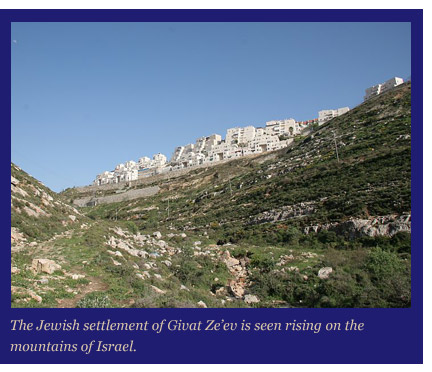
|
Building the Cities of Judah in the Face of World Opposition
The Mountains of Israel, the focus of the regathering.
|
|
Thursday, March 13, 2008
|
www.bibleinthenews.com Audio & Print versions
|
The world keeps trying to get the Jews out of Judah, but they just don't seem to be able to achieve their goals. This is David Billington with you for the Bible in the News.
The Jerusalem Post yesterday reported that:"The UN, the EU and the US on Monday deplored Israel's plans to build some 400 new homes in the Givat Ze'ev settlement. UN Secretary-General Ban Ki-moon expressed concern over the previous day's decision to approve the plan for a new haredi neighborhood in the settlement located just north of Jerusalem. "The secretary-general expresses his concern over the government of Israel's approval of a resumption of construction of 750 housing units in the West Bank settlement of Givat Ze'ev," Ban said in a
statement issued by his spokesperson."
 The question is why would the Israeli government approve the building of a new neighborhood in the West Bank, when the world will condemn them and when Ehud Olmert is promising to remove West Bank Jewish communities? The answer is in the makeup of the Israeli government. In Israel, governments are made up of several parties cobbled together to form a ruling coalition, as no one party is large enough to form a government alone. If one party pulls out of the collation the government could fall. Such is the current situation, a religious party called Shas is threatening to leave the coalition. Shas represents Ultra-Orthodox or Haredi Jews, who are very traditional in their Judaism, they do not necessarily advocate holding onto Judea and Samaria. However, quite a number or their constituents do and they have been under pressure to leave the government. Shas has declared that if Olmert begins negotiating on Jerusalem they will leave the government.
The question is why would the Israeli government approve the building of a new neighborhood in the West Bank, when the world will condemn them and when Ehud Olmert is promising to remove West Bank Jewish communities? The answer is in the makeup of the Israeli government. In Israel, governments are made up of several parties cobbled together to form a ruling coalition, as no one party is large enough to form a government alone. If one party pulls out of the collation the government could fall. Such is the current situation, a religious party called Shas is threatening to leave the coalition. Shas represents Ultra-Orthodox or Haredi Jews, who are very traditional in their Judaism, they do not necessarily advocate holding onto Judea and Samaria. However, quite a number or their constituents do and they have been under pressure to leave the government. Shas has declared that if Olmert begins negotiating on Jerusalem they will leave the government.The current government coalition is made up of four parties; Kadima with 29 seats, Labor with 19, Shas with 12 and the Pensioner's Party with 7, for a total of 67 seats. If Shas were to leave the government they would have 55 seats left. Now there are 120 seats in the Israeli Knesset, so you need at least 61 seats in order to function without help from the opposition. This gives Shas a lot of clout. The Jerusalem Post had a Analysis this week with the title, "The world can bark, but Shas has bite". The gist of the analysis was that people like US Secretary of State Condoleezza Rice can bark, but Shas are the ones who can bring down the government--so who will Olmert listen to? Political survival matters to these people more than anything else.
After the brutal, horrific terrorist attack in the Mercaz Yeshiva, Shas chairman Eli Yishai promised he will make sure that 100 housing units are built in the memory of every yeshiva student who was murdered. He went on to say: "The Americans want a building freeze, so we will make it clear to them that there is no freeze." The building freeze the Americans and Europeans want is in East Jerusalem, Judea and Samaria--all the land that they want for their Palestinian State. The world has been pushing hard for this for years and there is always much talk about dismantling the settlements in Judea and Samaria. The Olmert government in conjunction with President Bush wanted a peace treaty with the Palestinians to pave the way to their state, by the time Bush is to leave office this year. However, it looks very unlikely they can do much dismantling, working in their shaky coalition with Shas--and in reality the settlements are expanding.
In the prophets the focus of the regathering of the Jewish people is to the mountains of Israel. For example the prophet Ezekiel in chapter 38 declares -- while speaking to Gog the latter-day invader of Israel -- that: "After many days thou shalt be visited: in the latter years thou shalt come into the land that is brought back from the sword, and is gathered out of many people, against the mountains of Israel, which have been always waste: but it is brought forth out of the nations, and they shall dwell safely all of them... To take a spoil, and to take a prey; to turn thine hand upon the desolate places that are now inhabited, and upon the people that are gathered out of the nations, which have gotten cattle and goods, that dwell in the midst of the land." Ezekiel places the regathering and the object of Gog's invasion on the mountains of Israel in the midst of the land.
In Ezekiel 34:13-14 we note the same emphasis: "And I will bring them out from the people, and gather them from the countries, and will bring them to their own land, and feed them upon the mountains of Israel by the rivers, and in all the inhabited places of the country. I will feed them in a good pasture, and upon the high mountains of Israel shall their fold be: there shall they lie in a good fold, and in a fat pasture shall they feed upon the mountains of Israel." In Ezekiel 34 the regathered Jews are to be fed on the mountains of Israel by good shepherds, in other words they are to be instructed in the truth of God's word on the mountains of Israel.
When we compare this with Isaiah chapter 40 we can be even more sure that these mountains are the mountainous region in particular, of Judea and Jerusalem. Isaiah 40 is a chapter that is rightly applied to the work of John Baptist as both John and Matthew show. However, Jesus pointed out that the work of John Baptist was only a precursor to the greater work of the restoration of all things by Elijah the prophet in Matthew 17:11. We can see that Isaiah 40 while having an application to John, also has a future application to the time of the restoration of all things in verses 10-11: "Behold, the Lord GOD will come with strong hand , and his arm shall rule for him: behold, his reward is with him, and his work before him. He shall feed his flock like a shepherd: he shall gather the lambs with his arm, and carry them in his bosom, and shall gently lead those that are with young." This is a time when "his arm shall rule for him"! Notice also the metaphor of the shepherd again that we saw in Ezekiel 34. When we go back to verse 9 of Isaiah 40 we see that this shepherd is also feeding on the mountains of Israel, but here it is more specific (This is from the JPS translation which catches the proper sense also given in the AV margin): "O thou that tellest good tidings to Zion, get thee up into the high mountain; O thou that tellest good tidings to Jerusalem, lift up thy voice with strength; lift it up, be not afraid; say unto the cities of Judah: 'Behold your God!'" Here the feeding is taking place on the mountains of Israel, even the cities of Judah, the area which today is the center of a worldwide controversy--the West Bank. It is amazing how the controversy of Zion has been focused on this area.
Meanwhile, First Temple building remains have been found near the Temple Mount, in a dig near the Western Wall plaza close to the staircase leading up towards the Jaffa Gate. Israel National News reports that: "A vast amount of pottery vessels was also discovered, among them three jar handles that bear similar stamped impressions. An inscription written in ancient Hebrew script is preserved on one these impressions, reading "Belonging] to the King of Hevron." I can only think of one ancient Hebrew king who ruled in Hebron.
"Afterward shall the children of Israel return, and seek the LORD their God, and David their king; and shall fear the LORD and his goodness in the latter days." -Hosea 3:5
The days are quickly flying and Christ will come again! Come again next week God willing to www.bibleinthenews.com
Printed: Thursday, March 13, 2008
Visit www.bibleinthenews.com for a weekly analysis of world politics in the light
of Bible prophecy!